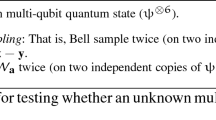Abstract
In this paper we show that algebraic feedback shift registers synthesis problems over residue class rings, some ramified extensions and some quadratic integer rings for multisequences are reduced to the successive minima problem in lattice theory. Therefore they can be solved by polynomial-time algorithms since the number of multiple sequences is fixed.

Similar content being viewed by others
References
Ajtai, M., Kumar, R., Sivakumar, D.: A sieve algorithm for the shortest lattice vector problem. In: Proceedings of STOC’01, pp. 601–610. ACM (2001)
Ajtai, M., Kumar, R., Sivakumar, D.: Sampling short lattice vectors and the closest lattice vector problem. In: Proceedings of the 17th IEEE Annual Conference on Computational Complexity-CCC, pp. 53–57 (2002)
Arnault, F., Berger, T.P., Necer, A.: Feedback with carry shift registers synthesis with the Euclidean algorithm. IEEE Trans. Inform. Theory 50, 910–917 (2004)
Arvind, V., Joglekar, P.S.: Some sieving algorithms for lattice problems. In: FSTTCS, pp. 25–36 (2008)
Baker, G.A., Graves-Morris, P.R.: Padé approximation. Cambridge University Press, Cambridge (1996)
Beckermann, B., Laban, G.: A uniform approach for Hermite padé and simultaneous padé approximants and their matrix-type generalizations. Numerical Algorithms 3, 45–54 (1992)
Beckermann, B., Labahn, G.: Fraction-free computation of simultaneous padé approximants. In: International Symposium on Symbolic and Algebraic Computation, pp. 15–24 (2009)
Berlekamp, E.R.: Algebraic Coding Theory. McGraw-Hill, New York (1968)
Blǒmer, J., Naew, S.: Sampling methods for shortest vectors, closest vectors and successive minima of lattices. Theor. Comput. Sci. 410, 1648–1665 (2009)
Cassels, J.W.: An introduction to the geometry of numbers. Springer, Berlin (1971)
Dadush, D., Peikert, C., Vempala, S.: Enumerative lattice algorithms in any norm via M-Ellipsoid coverings. arXiv:1011.5666v4
Ding, C.S.: Proof of Massey’s conjectured algorithm, Advances in Cryptology, Lecture Notes in Computer Science, vol. 330, pp. 345–349. Springer, Berlin (1988)
Feng, G.L., Tzeng, K.K.: A generalized Euclidean algorithm for multisequence shift-register synthesis. IEEE Trans. Inform. Theory 35, 584–594 (1989)
Feng, G.L., Tzeng, K.K.: A generalization of the Berlekamp-Massey algorithm for multisequence shift-register synthesis with applications to decoding cyclic codes. IEEE Trans. Inform. Theory 37, 1274–1287 (1991)
Goresky, M., Klapper, A.: Algebraic shift register sequences. Cambridge University Press, Cambridge (2012)
Hanrot, G., Stehle, D.: Improved analysis of Kannan’s shortest lattice vector algorithm. In: Proceedings of crypto 2007, LNCS 4622, pp. 170–186 (2007)
Helfrich, B.: Algorithms to construct Minkowski reduced and Hermite reduced bases. Theor. Comput. Sci. 41, 125–139 (1985)
Hu, H., Hu, L., Feng, D.: On the expected value of the joint 2-adic complexity of periodic binary multisequences, SETA 2006, LNCS 4086, pp. 199–208 (2006)
Kannan, R.: Minkowski’s convex body theorem and integer programming. Math. Oper. Res. 12, 415–440 (1987)
Klapper, A., Goresky, M.: 2-Adic shift registers, Fast software encryption. In: Proceedings of 1993, vol. 809, pp. 174–178. Cambridge (1994)
Klapper, A., Goresky, M.: Cryptanalysis based on 2-adic rational approxiamtion. In: CRYPTO 1995, LNCS 963, pp. 262–273 (1995)
Klapper, A., Goresky, M.: Feedback shift registers, 2-adic span, and combiners with memeory. J. Cryptol. 10, 11–47 (1997)
Klapper, A., Xu, J.: Algebraic feedback shift registers. Theor. Comput. Sci. 226, 61–92 (1999)
Klapper, A., Xu, J.: Register synthesis for algebraic feedback shift registers based on non-primes. Des. Codes Crypt. 31, 227–250 (2004)
Lenstra, A.K., Lenstra, H.W., Lovász, L.: Factoring polynomials with rational coefficients. Math. Ann. 261, 515–534 (1982)
Li, W., Sidorenko, V., Nielsen, J.: On decoding interleaved Chinese remainder codes IEEE International Symposium on Information Theory, pp. 1053–1056 (2013)
Liu, W., Klapper, A.: A lattice rational approximation algorithm for AFSRs over quadratic integer rings, SETA 2014, LNCS 8865, 200–211 (2014)
Massey, J.L.: Shift-register synthesis and BCH decoding. IEEE Trans. Inform. Theory 15, 122–127 (1969)
Mandelbaum, D.: On a class of Arithmetic codes and a decoding algorithm. IEEE Trans. Inf. Theory 22, 85–88 (1976)
Micciancio, D.: Efficient reductions among lattice problems. In: Proceedings of the 19th Annual ACM-SIAM Symposium on Discrete Algorithms, SODA 2008, pp. 84–93. Society for Industrial and Applied Mathematics (2008)
Micciancio, D., Voulgaris, P.: A deterministic single exponential time algorithm for most lattice problems based on Voronoi cell computations. In: STOC, pp. 351–358 (2010)
Mill, W.H.: Continued fractions and linear recurrences. Math. Comput. 29, 173–180 (1975)
Nguyen, P.Q., Stehle, D.: Low-dimensional lattice basis reduction revisited. In: Buell, D.A. (ed.) ANTS 2004, LNCS 3076, pp. 338–357 (2004)
Schmidt, G., Sidorenko, V.: Multi-sequence linear shift-register synthesis: the varying length case. In: IEEE International Symposium on Information Theory, pp. 1738–1742 (2006)
Sugiyama, Y., Kasahara, M., Hirasawa, S., Namekawa, T.: A method for solving key equation for decoding Goppa codes. Inform. Contr. 27, 87–99 (1975)
Wang, L.-P., Zhu, Y.-F., Pei, D.-Y.: On the lattice basis reduction multisequence synthesis algorithm. IEEE Trans. Inform. Theory 50, 2905–2910 (2004)
Xu, J., Klapper, A.: Feedback with carry shift registers over Z/(N). In: Proceedings SETA’98. Springer-Verleg, New York (1998)
Zhao, L., Wen, Q.: On the joint 2-adic complexity of binary multisequences. RAIRO-Theor. Appl. 46, 401–412 (2012)
Acknowledgements
We gratefully thank Wen-Feng Qi, Daniele Micciancio and Weihua Liu for fruitful discussions. We also thank the anonymous reviewers for very helpful suggestions and comments. The research was partially supported by National Natural Science Foundation of China (No. 61170289) and 973 Program (2013CB834203).
Author information
Authors and Affiliations
Corresponding author
Additional information
This article is part of the Topical Collection on Sequences and Their Applications.
Rights and permissions
About this article
Cite this article
Wang, LP., Wan, D. On lattice-based algebraic feedback shift registers synthesis for multisequences. Cryptogr. Commun. 10, 455–465 (2018). https://doi.org/10.1007/s12095-017-0230-0
Received:
Accepted:
Published:
Issue Date:
DOI: https://doi.org/10.1007/s12095-017-0230-0



